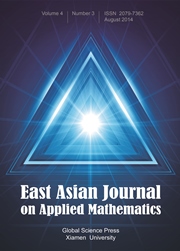Article contents
Direct Gravitational Search Algorithm for Global Optimisation Problems
Published online by Cambridge University Press: 20 July 2016
Abstract
A gravitational search algorithm (GSA) is a meta-heuristic development that is modelled on the Newtonian law of gravity and mass interaction. Here we propose a new hybrid algorithm called the Direct Gravitational Search Algorithm (DGSA), which combines a GSA that can perform a wide exploration and deep exploitation with the Nelder-Mead method, as a promising direct method capable of an intensification search. The main drawback of a meta-heuristic algorithm is slow convergence, but in our DGSA the standard GSA is run for a number of iterations before the best solution obtained is passed to the Nelder-Mead method to refine it and avoid running iterations that provide negligible further improvement. We test the DGSA on 7 benchmark integer functions and 10 benchmark minimax functions to compare the performance against 9 other algorithms, and the numerical results show the optimal or near optimal solution is obtained faster.
Keywords
MSC classification
- Type
- Research Article
- Information
- Copyright
- Copyright © Global-Science Press 2016
References
- 2
- Cited by


